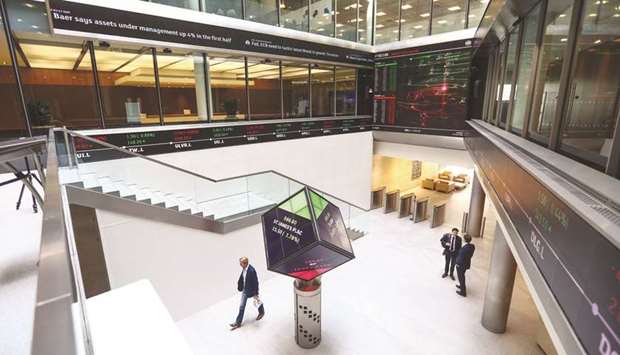Global stock markets suffered losses yesterday as China-US trade tensions resurfaced, with gloomy sentiment exacerbated by news of a recession in Hong Kong.
“Reports that China does not see a path to a comprehensive trade deal with US President Donald Trump has certainly taken some of the buzz out of the markets,” Oanda analyst Craig Erlam told AFP.
The Paris market was dogged by heavy losses for French carmaker PSA, whose stock tanked as investors remained unconvinced by a proposed mega-merger with Italy’s Fiat Chrysler.
Fiat’s share price rose in Milan.
Corporate earnings disappointment hurt London stocks with sizeable falls for energy major Royal Dutch Shell, as well as lenders Lloyds Banking Group and Standard Chartered.
London’s FTSE 100 closed 1.1% down at 7,248.38 points, Frankfurt’s DAX 30 ended 0.3% down at 12,866.79 points and
Paris’ CAC 40 finished 0.6% down at 5,729.86 points, while the EURO STOXX 50 lost 0.4% at 3,604.49 points.
Investors dumped risky equities for safer assets after Beijing slammed US Secretary of State Mike Pompeo for a speech it said had “viciously attacked” China.
“There’s been a broad risk-off move seen in the markets this morning after the latest comments from Beijing suggested that investors may be getting a little bit ahead of themselves in assuming a smooth de-escalation in trade tensions between the world’s two largest economies,” added XTB analyst David Cheetham.
Wall Street followed Europe lower, “with US-China trade uncertainty flaring back up”, said Charles Schwab analysts.
In the latest hawkish take on China by the Trump administration, Pompeo had on Wednesday called Beijing “truly hostile” to the United States, and vowed to ramp up pressure on China on multiple fronts.
“This deliberate distortion of the facts and slandering of China’s domestic and foreign policies fully exposes the deep political bias and anti-communist mindset of a small number of US politicians,” said foreign ministry spokesman Geng Shuang at a press briefing.
“Pompeo’s speech viciously attacked the Chinese Communist Party and the Chinese government,” added Geng.
Asian markets traded mixed yesterday after the Federal Reserve cut interest rates again and data showed the US economy remained “resilient”, though gains were also tempered by the bank’s indication it is unlikely to make any more reductions.
After announcing the third reduction this year, Fed chief Jerome Powell said that while the US-China trade row and Brexit uncertainty had hit investment, the economy had been “resilient to the winds that have been blowing this year”.
Hong Kong’s stock market rallied by 0.9%, but after the close came gloomy news of an official recession.
Shanghai ended down 0.4% after figures pointed to another contraction of China’s crucial manufacturing industry owing to the US trade war.
Official figures meanwhile showed Hong Kong’s gross domestic product in the third quarter shrank 3.2% from the previous quarter, which had already seen a drop of 0.4%.
The technical definition of a recession is two successive quarters of economic contraction.
The semi-autonomous Chinese city has been upended by nearly five months of huge, often violent, pro-democracy demonstrations with little end in sight as Beijing and city leaders adopt a hardline approach.
Clashes between protesters hurling bricks and petrol bombs at police wielding tear gas and rubber bullets have become a weekly occurrence.
Unrest has hit the city’s tourist and entertainment industries hard, compounding trade war woes.
The yen held onto gains versus the dollar after the Bank of Japan keep its ultra-easy monetary policy in place as expected and changed its forward guidance to more clearly signal the future chance of a rate cut.
Debate at the Fed and the BoJ highlights the struggle that many central banks are facing.
The US-China trade war and Britain’s divorce from the European Union have increased uncertainty, but central banks are somewhat reluctant to ease policy aggressively because interest rates are already very low in many major economies.
“The biggest thing that stands out is stocks look stronger after the Fed,” said Tsutomu Soma, general manager of fixed income business solutions at SBI Securities in Tokyo.
“Risks like US-China or Brexit haven’t been resolved completely, but the markets are starting to look beyond these risks.”
US stock futures edged 0.01% lower yesterday after the S&P 500 rose 0.33% to close at a record high on Wednesday for the second time in three trading sessions.
A positive mood on Wall Street carried over to Asian equities, except for Australian shares, which fell 0.39% after weak earnings from Australia and New Zealand Banking Group.
The Fed lowered its policy rate to 1.50%-1.75%, but dropped a previous reference in its statement to “act as appropriate” to sustain the economic expansion.
In his news conference, Powell listed several reasons why he feels the economy is doing well, such as robust consumer spending, strengthening home sales, and healthy asset prices.
The greenback fell to 7.0417 yuan in onshore trade, at one point falling to its lowest since August 19.
The yen rose 0.16% to 108.68 per dollar, holding onto gains after the BoJ left policy unchanged as expected.
In the energy market, oil futures erased loses and rose yesterday after as a massive buildup in US crude stock piles triggered a decline in futures on Wednesday.
US crude erased loses and rose 0.18% to $55.16 a barrel. Brent crude rose 0.36% to $60.83 per barrel.

Visitors walk past an illuminated rotating cube displaying share price information in the atrium of the London Stock Exchange Group offices in Paternoster Square. The FTSE 100 closed 1.1% down at 7,248.38 points yesterday.
